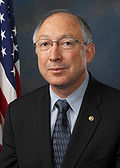| |||||||||||||||||
| |||||||||||||||||
 County results Salazar: 40–50% 50–60% 60–70% 70–80% Coors: 40–50% 50–60% 60–70% | |||||||||||||||||
| |||||||||||||||||
| Elections in Colorado |
|---|
 |
The 2004 United States Senate election in Colorado took place on November 2, 2004, alongside other elections to the United States Senate in other states as well as elections to the United States House of Representatives and various state and local elections. Incumbent Senator Ben Nighthorse Campbell (first elected in 1992 as a Democrat and re-elected in 1998 as a Republican, having switched parties in 1995) retired instead of seeking a third term. Democratic nominee Ken Salazar won the open seat, defeating Republican nominee Pete Coors despite Republican President George W. Bush carrying the state over John Kerry in the concurrent presidential race.



